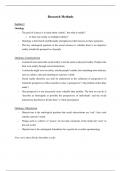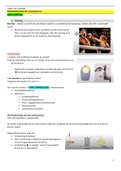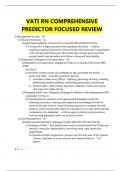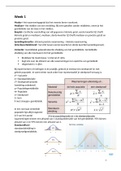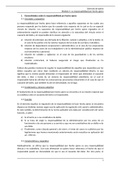Research Methods
Lecture 1
Ontology
- The goal of science is to learn about ‘reality’, but what is reality?
o Is there one reality or multiple realities?
- Ontology is the branch of philosophy (metaphysics) that focuses on these questions
- The key ontological question in the social sciences is whether there is an objective
reality outside the perspective of people
Ontology: Constructivism
- Constructivism states that social reality is not the same as physical reality. People crate
their own reality through social interactions
- A molecule might exist in reality, outside people’s minds, but something more abstract,
such as culture, only gets meaning in a person’s mind
- Social reality therefore can only be understood as the collection of perspectives in
which the perspective of the researcher is also ‘a perspective’ (‘the problem of the other
mind’)
- One perspective is not necessarily more valuable than another. The best we can do is
‘describe as thoroughly as possible the perspectives of individuals’ and the social
interactions that bind or divide them’ (= thick description)
Ontology: Objectivism
- Objectivism is the ontological position that social observations are ‘real’: they exist
outside a person’s mind
- Things such as ‘culture’ or ‘power’ are not only constructs of the mind, but ‘exist’ in
the real world
- Objectivism is the ontological foundation for a positivist or realist epistemology
Note: not a strict divide, but rather a scale
,Epistemology
- Epistemology is the branch of philosophy concerned with the theory of knowledge
o I.e., the nature of knowledge, justification, and the rationality of belief
- Resolves around the classical question: ‘what can I (learn to) know’
- A pertinent epistemological question for the social sciences is whether the methods
used in physics are equipped to study people, social interaction, and societies
Epistemology: Interpretivism
- Interpretivism states that there are vast differences between the methods social sciences
and natural sciences rely on
- Interpretivism states that social science should focus on ‘verstehen’ instead of
‘erklären? (Wilhelm Dilthey)
- Erklären: systematically study the conditions for certain events or relations
- Verstehen: trying to understand why events happen or why social relations exist
- According to interpretivists ‘verstehen’ is better suited for social science because the
perspective of people is critical in understanding their behavior
Epistemology: Positivism
- Positivism is the branch in social science which apply elements of the methodology
from natural sciences to explain social phenomena (but adapted to cope with the social
world)
o Find trends in observable data
- According to positivists social sciences should focus on predicting observable
phenomena
Epistemology: Realism
- Realism, in line with positivism, accepts the usefulness of the natural sciences
methodology and accepts that social reality is real and can be systematically studied
- Realism, however, leaves more room for ‘unobservable things’
- Realism is much more influential than strict positivism. For example, in political
science we rely on many abstract concepts which cannot be directly observed
Note: again, not a strict divide, but rather a scale
, Theory and Empirics
- In scientific research you deal with theory and empirics
- Theories are ideas about how things work
- Empirics is what we can factually observe in research
Induction and deduction
- (Almost) every research includes theory and empirics, but where do you start?
- Induction means you first observe reality, after which you try to order the results and
based on this you describe a pattern (formulate theory)
o Mostly used in interpretivism
- Deduction means you first think about patterns in reality (‘theorize’) after which you
check (do research) whether the theory makes sense in reality (in the empirical world)
o Mostly used in positivism and realism
Quantitative and qualitative research
- The defining feature of quantitative research is that reality is understood and described
with the help of numbers (in statistics) or words (in case studies); in qualitative research
reality is interpreted through the perspective of the researcher and people involved
- Quantitative research is therefore rooted in positivism or realism; qualitative research
is (more often) rooted in interpretivism
Note: while we do see qualitative research in a positivist/realist tradition, quantitative research
in a constructivist tradition is really rare.
Lecture 1
Ontology
- The goal of science is to learn about ‘reality’, but what is reality?
o Is there one reality or multiple realities?
- Ontology is the branch of philosophy (metaphysics) that focuses on these questions
- The key ontological question in the social sciences is whether there is an objective
reality outside the perspective of people
Ontology: Constructivism
- Constructivism states that social reality is not the same as physical reality. People crate
their own reality through social interactions
- A molecule might exist in reality, outside people’s minds, but something more abstract,
such as culture, only gets meaning in a person’s mind
- Social reality therefore can only be understood as the collection of perspectives in
which the perspective of the researcher is also ‘a perspective’ (‘the problem of the other
mind’)
- One perspective is not necessarily more valuable than another. The best we can do is
‘describe as thoroughly as possible the perspectives of individuals’ and the social
interactions that bind or divide them’ (= thick description)
Ontology: Objectivism
- Objectivism is the ontological position that social observations are ‘real’: they exist
outside a person’s mind
- Things such as ‘culture’ or ‘power’ are not only constructs of the mind, but ‘exist’ in
the real world
- Objectivism is the ontological foundation for a positivist or realist epistemology
Note: not a strict divide, but rather a scale
,Epistemology
- Epistemology is the branch of philosophy concerned with the theory of knowledge
o I.e., the nature of knowledge, justification, and the rationality of belief
- Resolves around the classical question: ‘what can I (learn to) know’
- A pertinent epistemological question for the social sciences is whether the methods
used in physics are equipped to study people, social interaction, and societies
Epistemology: Interpretivism
- Interpretivism states that there are vast differences between the methods social sciences
and natural sciences rely on
- Interpretivism states that social science should focus on ‘verstehen’ instead of
‘erklären? (Wilhelm Dilthey)
- Erklären: systematically study the conditions for certain events or relations
- Verstehen: trying to understand why events happen or why social relations exist
- According to interpretivists ‘verstehen’ is better suited for social science because the
perspective of people is critical in understanding their behavior
Epistemology: Positivism
- Positivism is the branch in social science which apply elements of the methodology
from natural sciences to explain social phenomena (but adapted to cope with the social
world)
o Find trends in observable data
- According to positivists social sciences should focus on predicting observable
phenomena
Epistemology: Realism
- Realism, in line with positivism, accepts the usefulness of the natural sciences
methodology and accepts that social reality is real and can be systematically studied
- Realism, however, leaves more room for ‘unobservable things’
- Realism is much more influential than strict positivism. For example, in political
science we rely on many abstract concepts which cannot be directly observed
Note: again, not a strict divide, but rather a scale
, Theory and Empirics
- In scientific research you deal with theory and empirics
- Theories are ideas about how things work
- Empirics is what we can factually observe in research
Induction and deduction
- (Almost) every research includes theory and empirics, but where do you start?
- Induction means you first observe reality, after which you try to order the results and
based on this you describe a pattern (formulate theory)
o Mostly used in interpretivism
- Deduction means you first think about patterns in reality (‘theorize’) after which you
check (do research) whether the theory makes sense in reality (in the empirical world)
o Mostly used in positivism and realism
Quantitative and qualitative research
- The defining feature of quantitative research is that reality is understood and described
with the help of numbers (in statistics) or words (in case studies); in qualitative research
reality is interpreted through the perspective of the researcher and people involved
- Quantitative research is therefore rooted in positivism or realism; qualitative research
is (more often) rooted in interpretivism
Note: while we do see qualitative research in a positivist/realist tradition, quantitative research
in a constructivist tradition is really rare.

